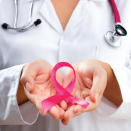Breast Health Q&A from Dr. Dell
View All Section Pages

Breast cancer screening recommendations can often be confusing. At what age should you have your first mammogram and how often should you continue? Is breast cancer preventable and if so, what can you do?
Cooper Clinic radiologist and breast imaging specialist R. Vance Dell, MD, receives questions like this on a daily basis. He answers the most commonly asked questions, some of which you may be surprised to know.
How often should I get mammogram?
Cooper Clinic recommends women receive their first mammogram at age 40 and continue annually.
However, if breast cancer runs in your family, Dell says the rules change a bit. If a woman with a first degree relative is diagnosed with breast cancer, then the woman should begin annual screenings 10 years before the age of the relative’s diagnosis.
“For example, if a woman was diagnosed at the age of 45 and she has daughters, then they should start receiving annual mammograms at age 35,” explains Dell.
Women in their 40s have very busy lives and while some women might think it’s not that serious to miss one mammogram, mammograms should be a priority.
Screening mammography is defined as a mammogram every year or every other year. Having a mammogram less often than every other year is not screening but random, and random mammography has never been shown to save lives. Getting a mammogram every year saves lives (every other year saves lives too, just not as many).
Is there a radiation risk with mammograms?
Some women are concerned with the potential radiation risk associated with getting a mammogram. While radiation in high doses can cause cancer, Dell says the amount received from a mammogram isn’t cause for concern.
"A high quality, 3D mammogram today is almost the exact same radiation dose as flying one way from New York City to Paris,” says Dell. In fact, a woman at the age of 40 can get a mammogram every year until she is 100 years old and have less radiation exposure than had she lived in Denver, Colorado, due to its thin ozone layer.
Does having dense breasts increase my risk?
Approximately 50 percent of women over age 40 have dense breasts. Women who fall into this category have a slightly increased risk for breast cancer.
On a mammogram, dense breast tissue appears as a solid white area which can make it difficult to see through. Because of this, Dell says women with dense breasts may need an additional screening, such as a high-quality ultrasound.
“With the combination of a 3D mammogram and a high-quality breast ultrasound, I can give a woman with dense breasts her screening results with as much confidence as I do to a woman with non-dense breasts,” says Dell.
Can hormone replacements increase my risk?
“The answer to that depends,” says Dell. “The dosage of estrogen and progesterone in hormone replacements in the past has increased the risk of breast cancer. However, there are new types of hormone replacements that have lower doses of estrogen and progesterone and fewer effects that negatively affect the body.
As for birth control pills, Dell says the hormone levels aren’t high enough to create a risk.
The Power of 3D Mammography
The best way to detect breast cancer early is with 3D mammography. "3D mammography has been proven to find cancer smaller and on average 15 months earlier than with normal mammography," explains Dell.
How does it work? Genius™ 3D Mammography™ takes a series of detailed images of the breast. This allows breast tissue to be evaluated layer by layer in more detail, helping to screen for cancer as small as 2 to 3 millimeters.
“When we find breast cancers smaller than 10 millimeters in size, 99 percent of these patients are alive five years later and more than 96 percent are alive 20 years later.”
Only about half of the facilities in the country have 3D equipment, including Cooper Clinic. Cooper Clinic provides women the specialized and comprehensive preventive care needed for breast cancer screening and diagnosis, including 3D mammogram technology. Cooper Clinic patients can schedule breast imaging the day of their comprehensive preventive exam.
For more information about breast imaging and 3D mammography at Cooper Clinic, visit cooper-clinic.com or call 972.560.2651.